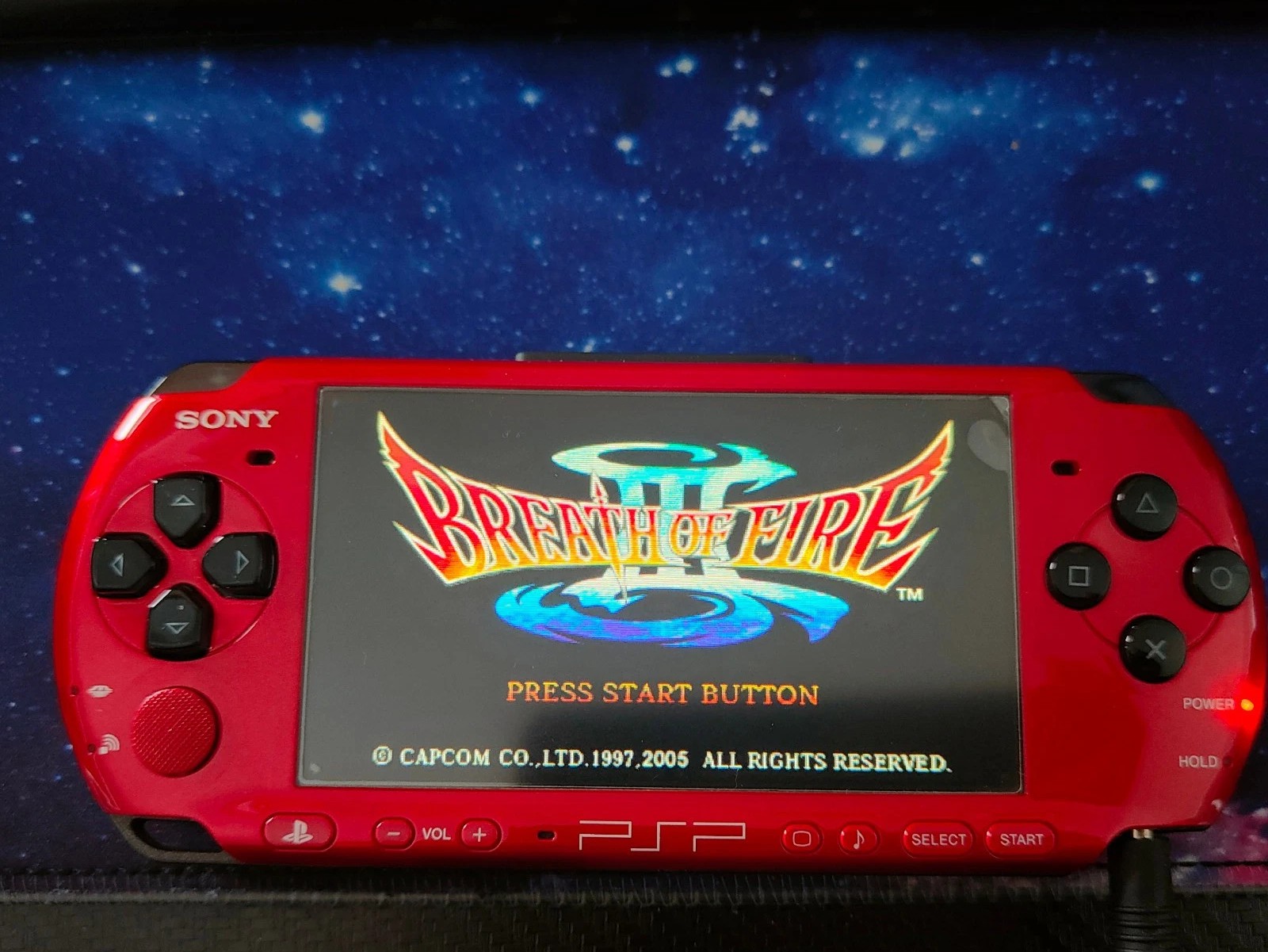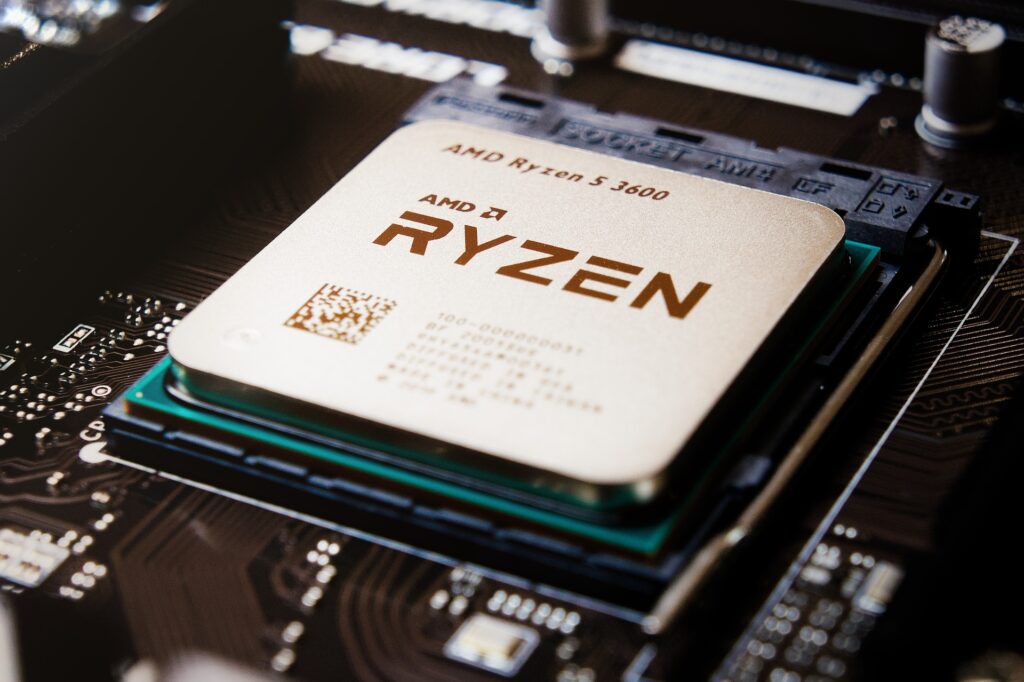
This comprehensive Ryzen CPU guide will help you navigate the lineup of Ryzen processors in order, making it easier to understand their differences. We’ll break down the key distinctions between various models, explain what the letters at the end of the model numbers signify, and provide insights into their performance and intended use cases.
With so many options available, choosing the right Ryzen CPU can feel overwhelming, but by the end of this article, you’ll have a clear understanding of the lineup, empowering you to make an informed decision with confidence!
Advanced Micro Devices
Advanced Micro Devices (AMD) have been in the CPU market for many years. They were originally the manufacturer for Intel processors. From this knowledge they started designing their own, which did pale in comparison to Intel’s.
As the years went on even though AMD processors were getting better year by year. It was still lagging behind intel’s over priced CPU’s, until recently. In 2017 the Ryzen Series CPU’s were released. The Ryzen 3, 5 and 7. These processors were on par with Intel’s and some of them were better. The Ryzen 9 didn’t come out until a bit later in September 2019.
Even today, Ryzen dominates the CPU market, (Got to love the underdog coming on top!) because of the price point AMD sells their processors, which are the best value for money per performance.
Processor Tiers
Each Ryzen Processor is characterized by the number. Which can automatically tell you how many cores and threads that Ryzen processor has. There is an exception to the rule the Ryzen 3 and 9. These come in two varieties as shown below:
Ryzen 3 – 4 cores 4 Threads / 4 Cores 8 Threads
Ryzen 5 – 6 cores 12 Threads
Ryzen 7 – 8 cores 16 Threads
Ryzen 9 – 12 cores 24 Threads / 16 cores 32 Threads
Ryzen Suffixes
Understanding the letters at the end of a Ryzen processor’s name can definitely help when choosing the right CPU. Here’s a breakdown of the common suffixes you’ll encounter:
X:
This typically indicates higher clock speeds and increased power consumption compared to the base model.XT:
This denotes a further refined version of the "X" model, usually with slightly higher clock speeds.X3D:
This signifies that the processor features AMD's 3D V-Cache technology. This technology adds extra cache memory, significantly boosting gaming performance.G:
This indicates that the processor includes integrated Radeon graphics. This means you can use the CPU without a dedicated graphics card.F:
This indicates that the processor does not have integrated graphics. Meaning that a dedicated graphics card is required.C- Cores | T – Threads | @ Clock Speed | Boost Speed | TDP | Socket | Compatible Memory
Ryzen 3
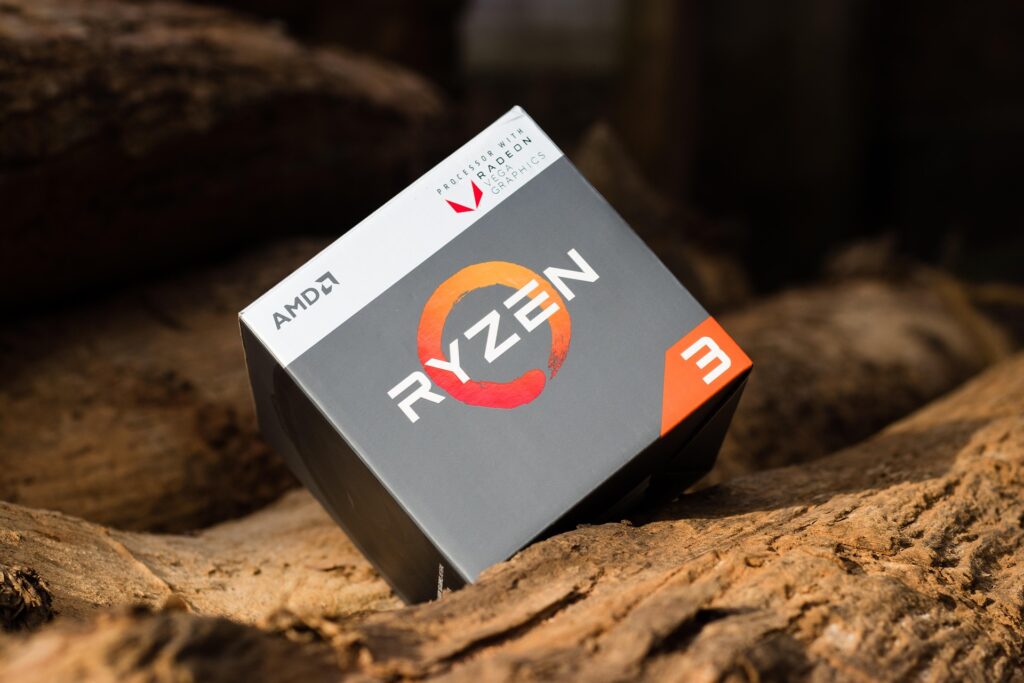
1st Generation
Ryzen 3 1200 4C 4T (3.1Ghz 3.4Ghz Boost) 65w AM4 DDR4
Ryzen 3 1200 4C 4T (3.10Ghz 3.4Ghz Boost) 65w AM4 DDR4
Ryzen 3 1300X 4C 4T (3.4Ghz 3.9Ghz Boost) 65w AM4 DDR4
2nd Generation
Ryzen 3 2200G 4C 4T (3.5Ghz 3.7Ghz Boost) 65w AM4 DDR4
Ryzen 3 2300X 4C 4T (3.5Ghz 4Ghz Boost) 65w AM4 DDR4
Ryzen 3 3200G 4C 4T (3.60Ghz 4Ghz Boost) AM4 65W DDR4
3rd Generation
Ryzen 3 3100 4C 8T (3.6gz 3.9Ghz Boost) AM4 65w DDR4
Ryzen 3 3300X 4C 8T (3.8Ghz 4.3Ghz Boost) AM4 65w DDR4
Ryzen 3 4100 – 4C 8T (3.8Ghz 4Ghz Boost) AM4 65w DDR4
Ryzen 3 4300GE – 4C 8T (3.5Ghz 4Ghz Boost) AM4 35w DDR4
Ryzen 3 4300G – 4C 8T (3.8Ghz 4Ghz Boost) AM4 65w DDR4
4th Generation
Ryzen 3 5350GE – 4C 8T (3.6Ghz 4.2Ghz Boost) AM4 35w DDR4
Ryzen 3 5300G – 4C 8T (4Ghz 4.2Ghz Boost) AM4 65w DDR4
Ryzen 3 5100 – 4C 8T (3.8Ghz 4.0Ghz Boost) AM4 65w DDR4
5th Generation
8300G – 4C 8T (3.4Ghz 4.9Ghz Boost) AM5 65w DDR5
C- Cores | T – Threads | @ Clock Speed | Boost Speed | TDP | Socket | Compatible Memory
Ryzen 5
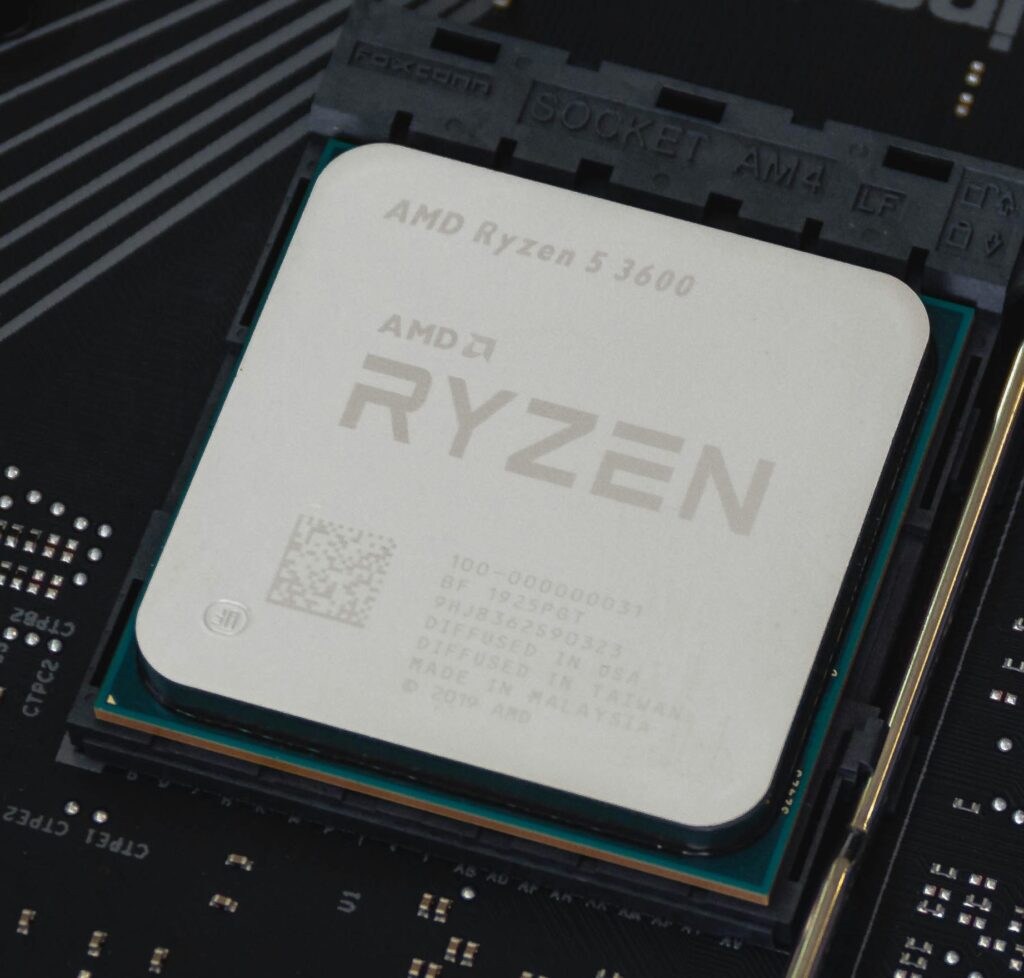
1st Generation
Ryzen 5 1500x 4C 8T (3.5 GHz 3.7 GHz) 65 W AM4 DDR4
Ryzen 5 1600 6C 12T (3.2 GHz 3.6 GHz) 65 W AM4 DDR4
Ryzen 5 1600x 6C 12T (3.6 GHz 4 GHz) 95 W AM4 DDR4
Ryzen 5 2400G 4C 8T (3.6 GHz 3.9 GHz) 65 W AM4 DDR4
Ryzen 5 2400GE 4C 8T (3.2 GHz 3.8 GHz) 65 W AM4 DDR4
2nd Generation
Ryzen 5 1600 AF 6C 12T (3.2 GHz 3.6 GHz) 65 W AM4 DDR4
Ryzen 5 2500X 4C 8T (3.6 GHz 4 GHz) 65 W AM4 DDR4
Ryzen 5 2600 6C 12T (3.4 GHz 3.9 GHz) 65 W AM4 DDR4
Ryzen 5 2600X 6C 12T (3.6 GHz 4.25 GHz) 95 W AM4 DDR4
Ryzen 5 3400G 4C 8T (3.7 GHz 4.2 GHz) 65 W AM4 DDR4
Ryzen 5 3400GE 4C 8T (3.3 GHz 4 GHz) 35 W AM4 DDR4
3rd Generation
Ryzen 5 3500 6C 6T (3.6 GHz 4.10 GHz) 65 W AM4 DDR4
Ryzen 5 3500X 6C 6T (3.6 GHz 4.10 GHz) 65 W AM4 DDR4
Ryzen 5 3600 6C 12T (3.6 GHz 4.2 GHz) 65 W AM4 DDR4
Ryzen 5 3600X 6C 12T (3.8 GHz 4.4 GHz) 95 W AM4 DDR4
Ryzen 5 3600XT 6C 12T (3.8 GHz 4.5 GHz) 95 W AM4 DDR4
Ryzen 5 4400GE 6C 12T (3.5 GHz 4.2 GHz) 35 W AM4 DDR4
Ryzen 5 4500 6C 12T (3.6 GHz 4.1 GHz) 65 W AM4 DDR4
Ryzen 5 4600G 6C 12T (3.7 GHz 4.2 GHz) 65 W AM4 DDR4
Ryzen 5 4600GE 6C 12T (3.3 GHz 4.2 GHz) 35 W AM4 DDR4
4th Generation
Ryzen 5 5500 6C 12T (3.6 GHz 4.2 GHz) 65 W AM4 DDR4
Ryzen 5 5500GT 6C 12T (3.6 GHz 4.4 GHz) 65 W AM4 DDR4
Ryzen 5 5600 6C 12T (3.5 GHz 4.4 GHz) 65 W AM4 DDR4
Ryzen 5 5600G 6C 12T (3.9 GHz 4.4 GHz) 65 W AM4 DDR4
Ryzen 5 5600GT 6C 12T (3.6 GHz 4.6 GHz) 65 W AM4 DDR4
Ryzen 5 5600T 6C 12T (3.5 GHz 4.60 GHz) 65 W AM4 DDR4
Ryzen 5 5600X 6C 12T (3.7 GHz 4.60 GHz) 65 W AM4 DDR4
Ryzen 5 5600X3D 6C 12T (3.3 GHz 4.4 GHz) 65 W AM4 DDR4
Ryzen 5 5600XT 6C 12T (3.7 GHz 4.70 GHz) 65 W AM4 DDR4
Ryzen 5 PRO 5645 6C 12T (3.7 GHz 4.6 GHz) 65 W AM4 DDR4
6th Generation
Ryzen 5 7500F 6C 12T (3.7 4.7Ghz) AM5
Ryzen 5 7600 6C 12T(3.8 GHz 5.1 GHz) AM5
Ryzen 5 7600X 6C 12T (4.7 GHz 5.3 GHz) AM5
Ryzen 5 7600X3D 6C 12T(4.1 GHz 4.7 GHz) AM5
Ryzen 5 7640H 6C 12T (4.3 GHz 5 GHz) AM5
Ryzen 5 7640HS 6C 12T (4.3GHz 5GHz) AM5
Ryzen 5 8400F 6C 12T (3.7GHz 5GHz) AM5
Ryzen 5 8500G 6C 12T (3.5GHz 5 GHz) AM5
Ryzen 5 8600G 6C 12T (4.3 GHz 5GHz) AM5
7th Generation
Ryzen 5 9600X 6C 12T (3.9GHz 5.4 GHz) 7th
Ryzen 5 9600X3D 6C 12T 7th AM5 (Unreleased)
C- Cores | T – Threads | @ Clock Speed | Boost Speed | TDP | Socket | Compatible Memory
Ryzen 7
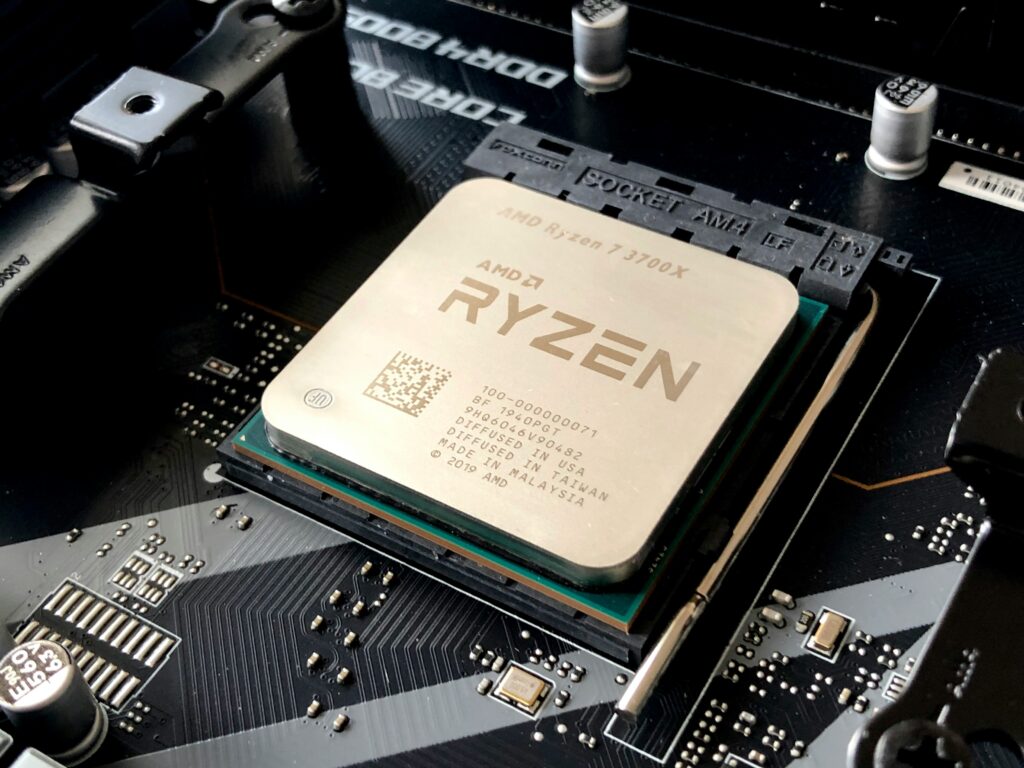
1st Generation
Ryzen 7 1700 8C 16T (3.0Ghz 3.7Ghz)AM4
Ryzen 7 1700X 8C 16T (3.4Ghz 3.8Ghz)AM4
Ryzen 7 1800X 8C 16T (3.6Ghz 4Ghz)AM4
2nd Generation
Ryzen 7 2700 8C 16T (3.2ghz 4.1Ghz)AM4
Ryzen 7 2700E 8C 16T (2.2Ghz 4Ghz)AM4
Ryzen 7 2700X 8C 16T (3.7Ghz 4.35Ghz)AM4
3rd Generation
Ryzen 7 3700X 8C 16T (3.6Ghz 4.4Ghz)AM4
Ryzen 7 3800X 8C 16T (3.9Ghz 4.5Ghz)AM4
Ryzen 7 3800XT 8C 16T (3.8Ghz 4.7Ghz)AM4
Ryzen 7 4700G 8C 16T (3.6Ghz 4.4Ghz)AM4
Ryzen 7 4700GE 8C 16T (3.10Ghz 4.3Ghz) AM4
Ryzen 7 4700S 8C 16T (3.6Ghz 4.1Ghz) AM4
4th Generation
Ryzen 7 5700 8C 16T (3.7Ghz 4.6Ghz) AM4
Ryzen 7 5700G 8C 16T (3.8Ghz 4.6Ghz) AM4
Ryzen 7 5700GE 8C 16T (3.2Ghz 4.6Ghz) AM4
Ryzen 7 5700X 8C 16T (3.4gGhz 4.6Ghz) AM4
Ryzen 7 5700X3D 8C 16T (3.0Ghz 4.1Ghz) AM4
Ryzen 7 5800 8C 16T (3.4Ghz 4.6Ghz) AM4
Ryzen 7 5800X 8C 16T (3.80Ghz 4.7Ghz) AM4
Ryzen 7 5800X3D 8C 16T (3.4Ghz 4.5Ghz) AM4
Ryzen 7 5800XT 8C 16T (3.8Ghz 4.8Ghz) AM4
6th Generation
Ryzen 7 7700 8C 16T (3.8Ghz 5.3Ghz) AM5
Ryzen 7 7700X 8C 16T (4.5ghz 5.4Ghz) AM5
Ryzen 7 7800X3D 8C 16T (4.2Ghz 5Ghz) AM5
Ryzen 7 8700F 8C 16T (4.10Ghz 5Ghz) AM5
Ryzen 7 8700G 8C 16T (4.20Ghz 5.1Ghz )AM5
7th Generation
Ryzen 7 8840HS 8C 16T (4.2Ghz 5.1Ghz) AM5
Ryzen 7 8845HS 8C 16T (3.8Ghz 5.1Ghz) AM5
Ryzen 7 9700X 8C 16T (3.80Ghz 5.5Ghz) AM5
Ryzen 7 9700X3D 8C 16T (4.70Ghz ) AM5 (Not Released)
C- Cores | T – Threads | @ Clock Speed | Boost Speed | TDP | Socket | Compatible Memory
Ryzen 9
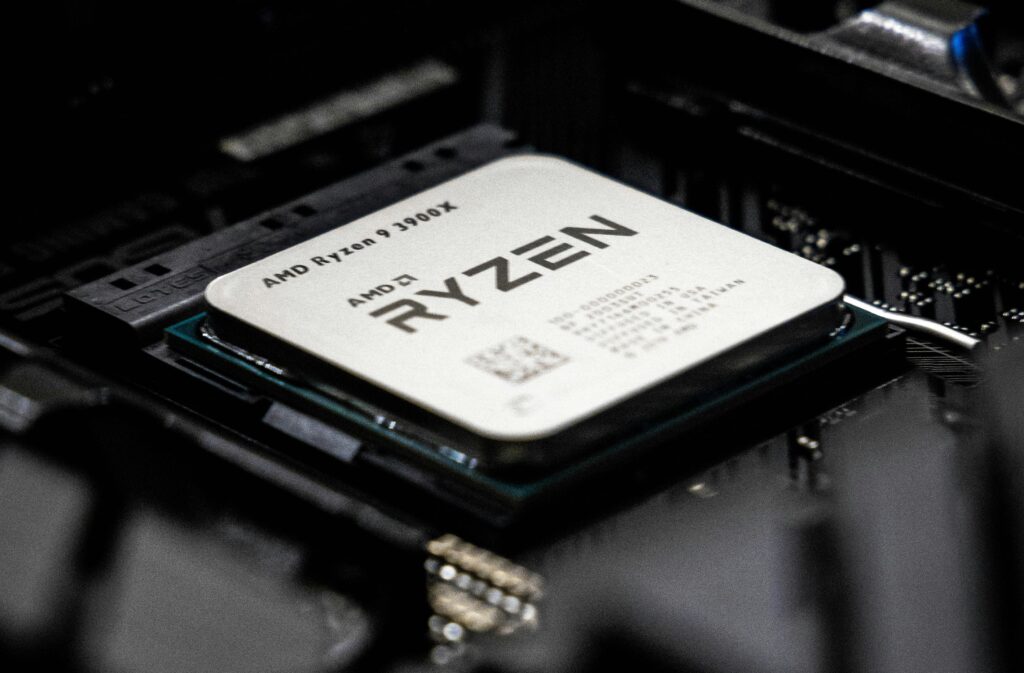
3rd Generation
Ryzen 9 3900 12C 24T (3.10Ghz 4.3Ghz) AM4
Ryzen 9 3900X 12C 24T (3.80Ghz 4.6Ghz) AM4
Ryzen 9 3900XT 12C 24T (4.10Ghz 4.7Ghz)AM4
Ryzen 9 3950X 16C 32T (3.5Ghz 4.7Ghz) AM4
4th Generation
Ryzen 9 5900 12C 24T (3.00Ghz 4.7Ghz) AM4
Ryzen 9 5900X 12C 24T (3.30Ghz 4.8Ghz) AM4
Ryzen 9 5900XT 16C 32T (3.30Ghz 4.8Ghz)AM4
Ryzen 9 5950X 16C 32T (3.40Ghz 4.9Ghz) AM4
6th Generation
Ryzen 9 7900 12C 32T (3.70Ghz 5.4Ghz) AM5
Ryzen 9 7900X 12C 32T (4.70Ghz 5.6Ghz) AM5
Ryzen 9 7900X3D 12C 32T (4.40Ghz 5.6Ghz) AM5
Ryzen 9 7950X 16C 32T (4.5Ghz 5.7Ghz) AM5
Ryzen 9 7950X3D 16C 32T 4.20Ghz 5.7Ghz AM5
7th Generation
Ryzen 9 9900X 12C 24T 4.40Ghz 5.6Ghz) AM5
Ryzen 9 9900X3D 12C 24T (4.40Ghz 5.5Ghz) AM5
Ryzen 9 9950X 16C 32T (4.30Ghz 5.7Ghz) AM5
Ryzen 9 9950X3D 16C 32T (4.30Ghz 5.7Ghz) AM5
What’s suitable for your needs
Knowing which is the best processor can be a daunting task, if you don’t really know. You might end up spending a lot of money on a CPU just for word documents or spreadsheets.
This isn’t just money wasted on a processor, it’s money you could’ve kept in your pocket for something else. Plus, the extra power simply won’t be used for its intended purpose. So, here’s a quick overview to help you choose the right processor for your needs.
Office
If you just need a computer to process word documents, then you don’t really need to go higher than a Ryzen 3. With 4 cores and 8 Threads that is plenty of power for multiple spreadsheets. It is also future proof as this processor would last you a very long time.
A long time ago 4 cores and 8 Threads was a standard for gaming. For Office work, I don’t think that would ever change. The only downside to this is, AMD have not produced a Ryzen 3 for a long time. So only a few new ones are left in the wild unless you opt for second hand.
Budget Gaming
If you’re gaming on a budget, there are plenty of processor that would fit your needs with integrated graphics. This is located with the suffix “G” at the end of the Ryzen model number. I would typically recommend a Ryzen 5 2400G /2400GE and upwards. Which both have Vega 11 integrated Graphics.
There are a wide variety of games you can play at decent frame rates. It all depends on how demanding the game is. A quick YouTube search will show you what the Vega 11 is capable of. Even on a budget these processors are not bad at all. Perfect if you can’t afford a dedicated graphics card straight away.
Medium-End Gaming
If you want a medium end system you need a dedicated graphics card paired with the processor. I would recommend anything from a Ryzen 5 2600 upwards, you can’t go wrong. You can even pair this processor with really good graphics cards. Again, a quick YouTube search will show you what this processor is capable of.
Content Creator & High-end Gaming
With a high-end gaming processor, I would recommend the 6th and 7th generation of Ryzen 5 and 7 at the lowest. If you are content creating such as game designing on Unreal Engine, Unity etc. Then any Ryzen 9 would be best in this regard, as it has the most cores and threads, for multi-task processing.

Conclusion
Here is a view of all the Desktop Ryzen Processors created, in this Ryzen CPU guide. It can be particularly overwhelming, even if you do have some knowledge of Ryzen processors, never mind those that don’t know where to start!
As you noticed, there is a generation missing for desktop Ryzen processors. This is the 5th Generation, these are only mobile processors and no desktop processors were released, for the 5th Gen.
Searching the web personally I couldn’t really find a comprehensive guide. This guide should clear a lot of things up for you and will lead you in the right direction when buying a Ryzen processor for your needs!
Before diving into the best Ryzen options, it’s worth brushing up on the basics. Not sure how a CPU actually works? Check out our breakdown on how a processor works it’ll help you understand why Ryzen stands out.
Not a fan of Team Red? Not to worry, I have a full comprehensive guide for Team Blue! Or perhaps you’ve had a enough of reading about processors. Check out How does Ram Affect Gaming?




